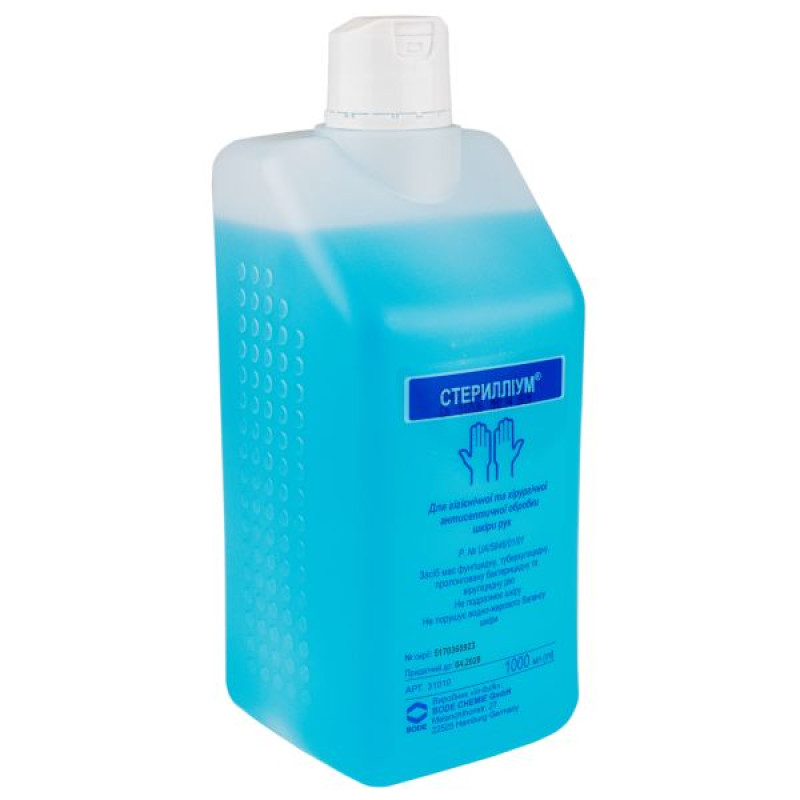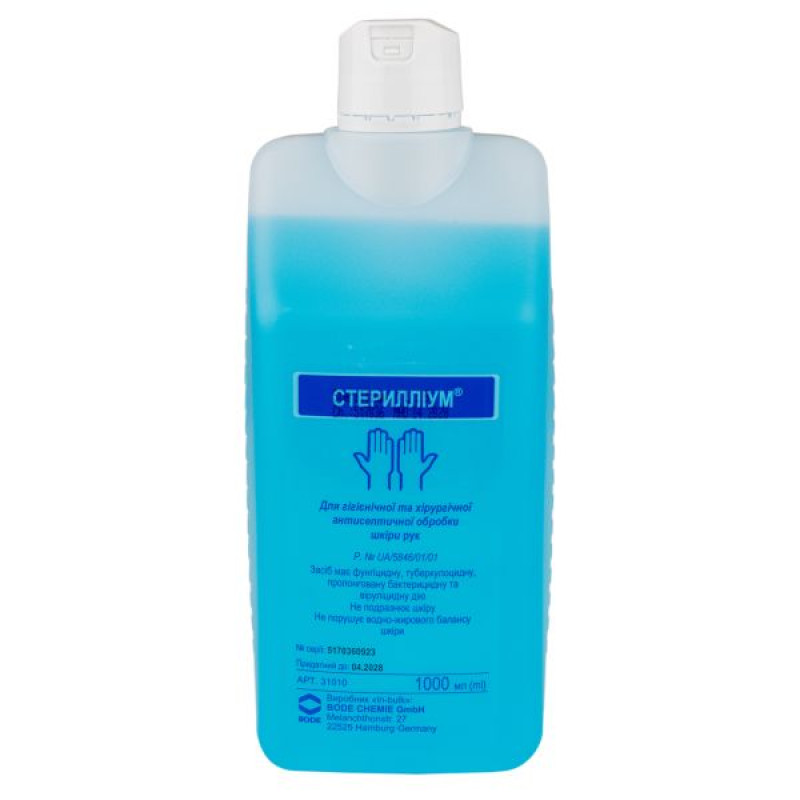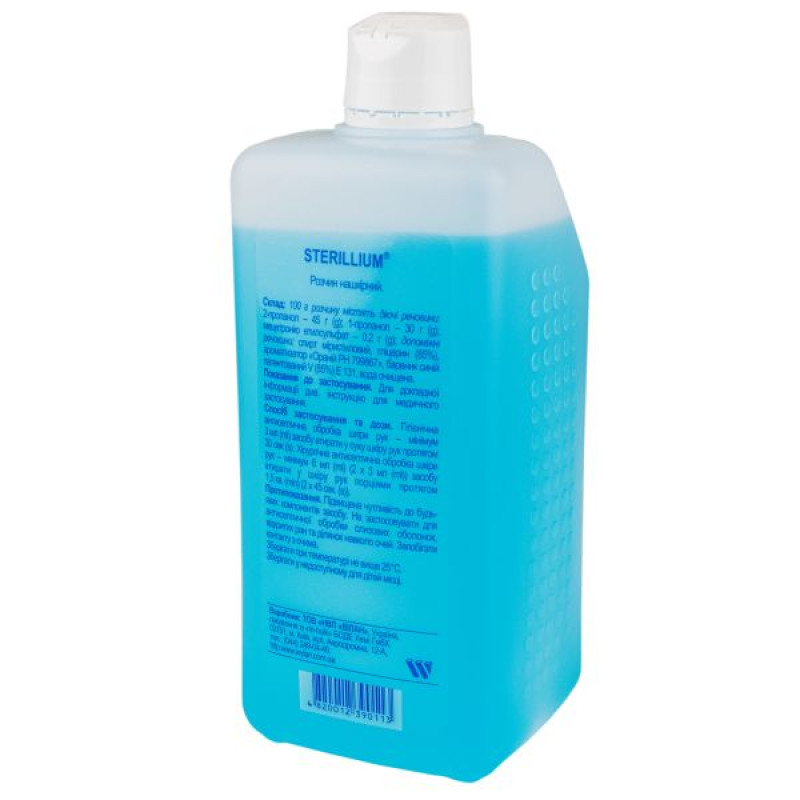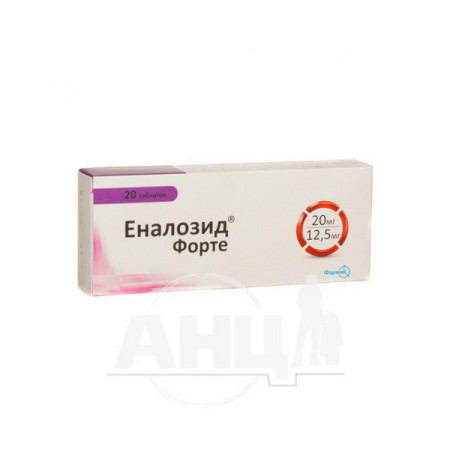Sterillium skin alcohol solution plastic bottle 100 ml

Instructions Sterillium solution for skin alcohol bottle plastic 100 ml
Composition
active ingredients: 100 g of solution contain: 2-propanol – 45 g, 1-propanol – 30 g, mecetronium ethyl sulfate – 0.2 g;
excipients: myristyl alcohol, glycerin (85%), flavoring "Oraniy РН 799867", patented blue dye V (85%) E 131, purified water.
Dosage form
The solution is topical.
Main physicochemical properties: transparent, light blue solution with a fresh alcoholic odor, density at 20 °C – 0.847-0.855 g/cm3, refractive index n 20/D − 1.376-1.381.
Pharmacotherapeutic group
Antiseptics and disinfectants. ATX code D08A X53.
Pharmacological properties
Pharmacodynamics.
The agent has fungicidal, tuberculocidal and prolonged bactericidal action, including against the following species of bacteria and their strains, as well as strains resistant to antibiotics: Acinetobacter baumannii; Acinetobacter calcoaceticus; Acinetobacter lwoffii; Bacteroides fragilis; Burkholderia cepacia; Candida albicans; Clostridium difficile; Enterobacter aerogenes; Enterobacter cloacae; Enterococcus faecalis; Enterococcus faecium; Escherichia coli; Haemophilus influenzae; Klebsiella pneumoniae; Klebsiella oxytoca; Listeria monocytogenes; Micrococcus luteus; Mycobacterium tuberculosis; Proteus mirabilis; Pseudomonas aeruginosa; Salmonella enteritidis; Salmonella typhimurium; Serratia marcescens; Shigella sonnei; Staphylococcus aureus; Staphylococcus epidermidis; Staphylococcus haemolyticus; Staphylococcus hominis; Staphylococcus saprophyticus; Streptococcus pneumoniae; Streptococcus pyogenes; Vibrio cholerae.
The drug has a virucidal effect, including against hepatitis B and C1 viruses, HIV, herpes type 1 (herpes labialis) and herpes type 2 (herpes genitalis), rotaviruses, polyomaviruses, vaccinia, adenoviruses, influenza A viruses, avian influenza, SARS - associated with coronaviruses (SARS-CoV).
The product is certified in accordance with European standards EN 12791, EN 1500.
Pharmacokinetics.
Sterillium® has the following properties:
reduces the amount of transient skin microflora by 100,000 times in 30 seconds;
also effective against resident skin microflora;
a fast-acting agent that retains its effect for 1 hour on unprotected skin of the hands and for 3 hours under medical gloves;
provides an antiperspirant effect, reduces the amount of moisture under the glove, which prevents the release of resident microflora from the deep layers of the skin;
does not irritate the skin;
does not disrupt the water-fat balance of the skin.
1 Surrogate virus – BVDV (bovine viral diarrhea virus).
Indication
Hygienic and surgical antiseptic treatment of the skin of the hands and antiseptic treatment of the skin before
injections, punctures, blood sampling, vaccinations.
Contraindication
Hypersensitivity to any of the product's components. Do not use for antiseptic treatment of mucous membranes, open wounds and areas around the eyes.
Avoid contact with eyes.
Interaction with other medicinal products and other types of interactions
Not installed.
Application features
Do not transfer Sterillium® antiseptic from one bottle to another, as this may cause contamination of the product. If transfer cannot be prevented, the procedure should be performed in a sterile manner.
Flammable. Safety precautions should be followed when working with alcohol-based products. In case of accidental spillage, the product must be immediately collected and diluted with plenty of water, ventilate the room, and remove flammable objects.
Do not smoke. Avoid contact with open flames. Do not use near sources of ignition. In case of fire, use water, fire extinguishers (powder, foam or carbon dioxide). Flash point – 23 °C.
Use electrical appliances only after the product has completely dried.
Use during pregnancy or breastfeeding
The risks of using the drug during pregnancy or breastfeeding are unknown.
Ability to influence reaction speed when driving vehicles or other mechanisms
There are no reservations.
Method of administration and doses
The product for external use can be used everywhere, even in the absence of sinks for washing and water.
For convenience when using the drug Sterillium®, it is better to take it with a dosing device. Available dosing systems allow you to take Sterillium® without contact. The dispensers can be placed regardless of the presence of sinks or washbasins where hygienic antiseptic treatment of the skin of the hands is required.
1. Hygienic antiseptic treatment of the skin of the hands is directed against the transient microflora of the skin of the hands without disturbing the resident microflora.
Hygienic antiseptic treatment of the skin of the hands is carried out:
in institutions, enterprises, healthcare institutions and organizations;
in preschools, educational institutions of various levels of accreditation;
at enterprises of the cosmetic, pharmaceutical, and microbiological industries;
at food industry enterprises;
in catering and trade establishments;
on all types of transport;
at municipal facilities;
in social protection institutions;
in penitentiary institutions;
Hygienic antiseptic treatment of the skin of the hands is recommended before:
entering aseptic rooms (preoperative, sterilization departments, intensive care units, hemodialysis departments);
performing invasive interventions (installing catheters, giving injections, bronchoscopy, endoscopy);
activities that may cause infection of the object (for example, preparing infusions, filling containers with solutions);
every direct contact with patients;
by moving from an infected to an uninfected area of the patient's body;
contact with sterile material and instruments;
using gloves;
after:
contact with contaminated objects, liquids or surfaces (for example, with a urine collection system, contaminated linen, biosubstrates, patient secretions);
contact with already inserted drains, catheters or with the site of their insertion;
every contact with wounds;
every contact with patients;
removing gloves;
using the toilet;
after cleaning the nose (with rhinitis there is a high probability of a viral infection with subsequent excretion of S.aureus).
The sequence of the antiseptic rubbing method for hygienic hand treatment according to the European standard EN 1500 is shown in Fig. 1. Hands should not be washed after antiseptic treatment.
Standard rubbing method for hygienic hand treatment according to EN 1500
| Stage 1: Palm to palm of the hands, including the wrists | Stage 2: Right palm on the left back of the hand and left palm on the right back of the hand |
| Stage 3: Palm to palm with fingers crossed | Stage 4: Outer side of fingers on opposite palm with fingers crossed |
| Stage 5: Circular rubbing of the left thumb in the closed palm of the right hand and vice versa | Stage 6: Circular rubbing of the closed fingertips of the right hand on the left palm and vice versa |
Add the antiseptic to the palms of dry hands. According to the given scheme, rub the antiseptic vigorously for 30 seconds into the skin of the hands, including the wrists. At each stage, repeat the movement 5 times. After completing the sixth stage, repeat individual movements until the end of the exposure time. If necessary, repeat the rubbing with a new portion of the antiseptic. Make sure that the hands remain moistened with the preparation throughout the rubbing.
Routine hygienic antiseptic treatment of the skin of the hands without subsequent washing should be performed before and after examining each patient, as well as before and after each medical procedure.
Method of hygienic antiseptic treatment of hand skin
| Before and after contact without visible hand contamination | |
| Take at least 3 ml of Sterillium® antiseptic directly from the plastic bottle or using the dosing device into the hollow of a dry palm. Then rub the product vigorously into the palm, fingers, between the fingers, the skin on the back of the palm, the cuticles and the nail folds. | |
The product must be rubbed in for 30 seconds. Throughout the treatment, hands should be moistened with an antiseptic. | |
In special cases, namely:
a) in case of droplet contamination of hands – carefully remove the contamination with a disposable napkin soaked in Sterillium®, then treat hands with Sterillium® antiseptic according to the method (see Fig. 1);
b) if hands are excessively contaminated with secretions, secretions, or blood, first wash hands with water, then with regular soap or soap with antimicrobial effect, preventing water from splashing into the environment and onto clothing (for example, in the case of blood contamination). Dry hands thoroughly with a lint-free disposable towel. After that, hands should be treated with an antiseptic according to the standard method (see Fig. 1). If necessary, disinfect the contaminated area and put on new overalls.
2. Surgical antiseptic treatment of the skin of the hands of medical personnel is directed against transient and resident microflora of the skin of the hands.
Surgical antiseptic treatment of the skin of the hands is carried out before each surgical intervention.
Technique of surgical antiseptic treatment of the skin of the hands
| Before each surgical intervention | |
| 1. Wash hands and forearms with water and a mild emulsion, such as Bactolin® Bazik, then rinse thoroughly. Use a sterile nail brush only if necessary, as the brush can cause micro-injuries to the skin. | |
| 2. Dry your hands thoroughly with a lint-free, disposable towel. Hands should be dry. | |
3. Take Sterillium® antiseptic from the dispenser into a dry palm (press the dispenser lever several times with your elbow) and moisten your hands and forearms. Rub Sterillium® into the skin of the hands (see Fig. 1) and forearms, including the wrist and elbow joints, for 1.5 minutes. At the same time, periodically take as many portions of the antiseptic as necessary so that the hands are moistened with the product throughout the entire rubbing time. The palms should be kept above the level of the elbows. The last portion of the antiseptic should be rubbed into the skin until dry. For the entire procedure, you should use at least 6 ml (2x3 ml) of the product. | |
| ATTENTION! Do not put gloves on hands that are wet from antiseptic, wait for the skin of your hands to dry completely. | |
3. Antiseptic treatment of the skin before injections and punctures.
Antiseptic skin treatment should be performed before injections, punctures, blood sampling, minor surgical interventions, as well as for antiseptic treatment of minor skin injuries.
Antiseptic treatment of the skin before injections and punctures
in places of possible interventions, dry skin must be treated with a swab moistened with Sterillium® for 15 seconds;
Before minor surgical interventions (before punctures of joints, cavities and body cavities), treat the skin for 1 minute;
Skin with a large number of sebaceous glands should be moisturized with the product for 10 minutes.
4. Dosage.
In medical practice
Hygienic antiseptic treatment of the skin of the hands - rub at least 3 ml of the product into dry skin of the hands for 30 seconds.
Surgical antiseptic treatment of the skin of the hands - at least 6 ml (2x3 ml) of the product should be rubbed into the skin of the hands in portions for 1.5 minutes (2x45 seconds).
- In industry
Rub 3 ml of Sterillium® into dry skin of hands for 30 seconds.
- In other industries where hygiene standards are required, and in everyday life
Rub 3 ml of Sterillium® into dry skin of hands for 30 seconds.
Hygienic antiseptic treatment of the skin of the hands for the prevention of diseases caused by pathogens:
Exhibition name
Hepatitis B virus, C/HIV 15 seconds
herpes virus type I, II 15 seconds
influenza A virus 15 seconds
rotavirus 15 seconds
vacciniavirus 15 seconds
bird flu virus 15 seconds
SARS virus 30 seconds
adenovirus* 30 seconds
polyomavirus* 60 seconds
multidrug-resistant Staphylococcus aureus (MRSA) 30 seconds
enterohemorrhagic Escherichia coli (EHEC) 30 seconds
Mycobacterium tuberculosis* 30 seconds
salmonella 15 seconds
listeria 15 seconds
Vibrio cholerae 30 seconds
__________________________________________________________
*According to the recommendations of the R. Koch Institute (RKI), Germany,
To prevent tuberculosis (test with M. terrae), adenovirus and polyomavirus infections, repeat the procedure twice.
Make sure that your hands remain moisturized with the product throughout the entire time you are rubbing the product in.
Children
The drug should not be used to treat the skin of newborns and premature babies.
In other cases, the drug should be used as prescribed by a doctor.
Overdose.
In case of accidental ingestion, the main symptoms of intoxication are the same as in the case of ethanol ingestion. Danger of respiratory arrest.
At 3-4% and above: elimination of secondary symptoms of poisoning by hemodialysis.
Side effects. Allergic reactions, skin irritation are possible in case of hypersensitivity to the components of the product. If the product accidentally gets into the stomach, alcohol poisoning is possible, the victim should rinse the mouth with drinking water, give several glasses of water to drink. If the product accidentally gets into the eyes, irritation of the mucous membrane of the eyes is possible, the victim should rinse his eyes with running water for several minutes and be sure to consult a doctor.
Overdose
In case of accidental ingestion, the main symptoms of intoxication are the same as in the case of ethanol ingestion. Danger of respiratory arrest.
At 3-4% and above: elimination of secondary symptoms of poisoning by hemodialysis.
Side effects
Allergic reactions and skin irritation are possible in case of hypersensitivity to the components of the product. If the product accidentally gets into the stomach, alcohol poisoning is possible. The victim should rinse their mouth with drinking water and drink several glasses of water. If the product accidentally gets into their eyes, irritation of the mucous membrane of the eyes is possible. The victim should rinse their eyes with running water for several minutes and consult a doctor.
Expiration date
5 years from the date of manufacture "in-bulk".
Storage conditions
Store at a temperature not exceeding 25 ° C. Keep out of the reach of children.
Incompatibility
Sterillium® corrodes acrylic glass and similar products.
Packaging
Plastic bottles of 100 ml or 500 ml, or 1000 ml, plastic canisters of 5 liters.
Vacation category
Without a prescription.
Producer
LLC "SPE "VILAN", Ukraine,
packaging from "in-bulk" BODE Chemie GmbH (Germany).
Address
03151, Kyiv, Aerodromna St., 12-A.
Phone: (044) 249-04-40, fax: (044) 246-17-43.
http:www.wylan.com.ua
There are no reviews for this product.
There are no reviews for this product, be the first to leave your review.
No questions about this product, be the first and ask your question.









